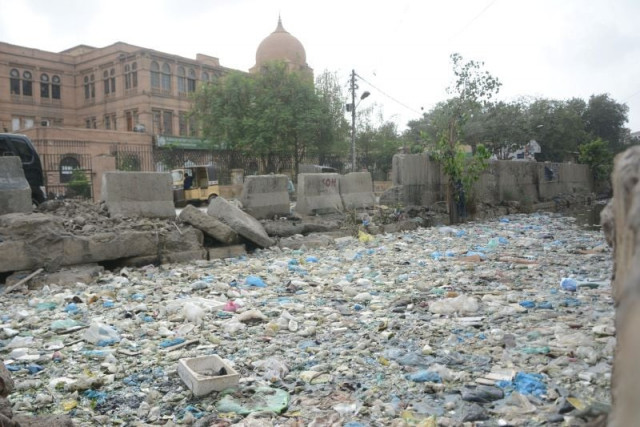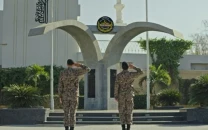Karachi's drain cleaning remains unfinished
Days before the monsoon cycle begins, the govt has only provided half of the requested amount

With another monsoon season upon us, Karachi, the nation's economic hub, is on edge, anticipating crippling urban floods that have tragically become all too familiar. The forecast of heavier-than-usual rainfall starting this month once again highlights the city's perennial struggle with inadequate drainage infrastructure.
Despite warnings from the Pakistan Meteorological Department (PMD) and past experiences of severe flooding, preparations to clear the city's choked storm drains appear far from complete. The Karachi Metropolitan Corporation (KMC), responsible for maintaining the drainage system, had requested Rs 800 million for this crucial task. However, the provincial government has only dished out Rs 410 million mere days before the monsoon onset.
Zulfiqar Abro, Senior Director of Municipal Services, disclosed that while the KMC sought Rs 800 million, only half that amount has been released. A contractor is expected to receive a work order by July 6 to commence cleaning 541 drains across the city, which is just days before the predicted downpour.
Under the direction of Karachi Mayor Murtaza Wahab, the KMC initiated cleaning operations on May 15 using its own resources. Work began on major arteries, including Kalri, Orangi, Mahmoodabad, City, Soldier Bazaar, and Frere drains from June 1 onwards. Additional drains identified by local administrations are also receiving attention with KMC resources.
Read: KMC can collect Rs4.5b annually in taxes: mayor
Despite these efforts, challenges persist. Atif Ali Khan, Chairman of North Nazimabad Town, lamented the insufficient machinery provided by KMC. "Just one excavator and two dumpers are insufficient for the monumental task at hand." He highlighted recurring issues such as debris reaccumulating in cleaned drains and incomplete integration of rainwater disposal systems in areas like Arafat Town, Kausar Niazi Colony, Batha Town, and Noorani Mohalla.
Commenting on the situation, urban planner Muhammad Tauheed stressed the need for at least four annual cleaning campaigns, advocating community involvement and awareness. Tahir urged authorities to eliminate garbage dumping near drains, expansion of the existing network to prevent blockages, and separate sewage lines from storm drains, emphasizing the need for dedicated sewage systems.
For decades, experts have criticized Karachi's poorly planned infrastructure, which has been compounded by garbage accumulation. The delayed cleaning contract, initially scheduled for May, sources revealed, has left the KMC grappling with limited resources and the city vulnerable to potential floods.
On the other hand, Chief Meteorologist Sardar Sarfraz cautioned about the above-average rainfall this month, with the monsoon season extending until September 30. Karachi's history of extreme rainfall, including a record-breaking 230 mm in a single day on August 27, 2020, only raises the alarm bells. In the midst of these challenges, Advocate Saifuddin, an opposition leader in the KMC, accused Mayor Wahab of neglecting timely drain cleaning, attributing potential urban flooding to resource constraints.
While experts consider it an underestimation, a KMC report identifies 19 crucial locations prone to severe flooding during monsoons, including Tower, PIDC, II Chundrigar Road, Shaheen Complex, and Shahrah-e-Faisal. Other vulnerable areas include Nagan Chowrangi, Banaras Chowrangi, KDA Chowrangi, Yousuf Goth, and Surjani Town.



















COMMENTS
Comments are moderated and generally will be posted if they are on-topic and not abusive.
For more information, please see our Comments FAQ